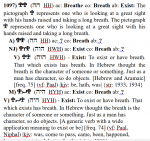Something I've been thinking about:
Of all of Jesus' "I am" statements in John, only one is capitalized, namely where He said "Before Abraham was, I AM" (John 8:58). We know that it hearkens back to Exodus 3, where God spoke to Moses from the burning bush: "I AM who I AM. Thus you shall say to the children of Israel, 'I AM' has sent me to you".
However, I've been wondering: Do Jesus' other "I am" statements in John's Gospel also point back to Exodus 3, even though the "I am" is not capitalized?
Thanks
Of all of Jesus' "I am" statements in John, only one is capitalized, namely where He said "Before Abraham was, I AM" (John 8:58). We know that it hearkens back to Exodus 3, where God spoke to Moses from the burning bush: "I AM who I AM. Thus you shall say to the children of Israel, 'I AM' has sent me to you".
However, I've been wondering: Do Jesus' other "I am" statements in John's Gospel also point back to Exodus 3, even though the "I am" is not capitalized?
Thanks

